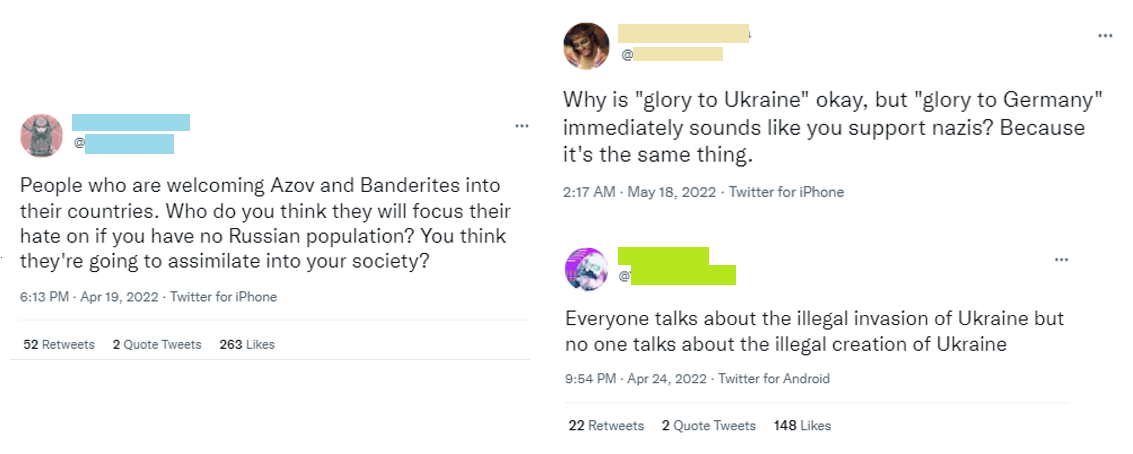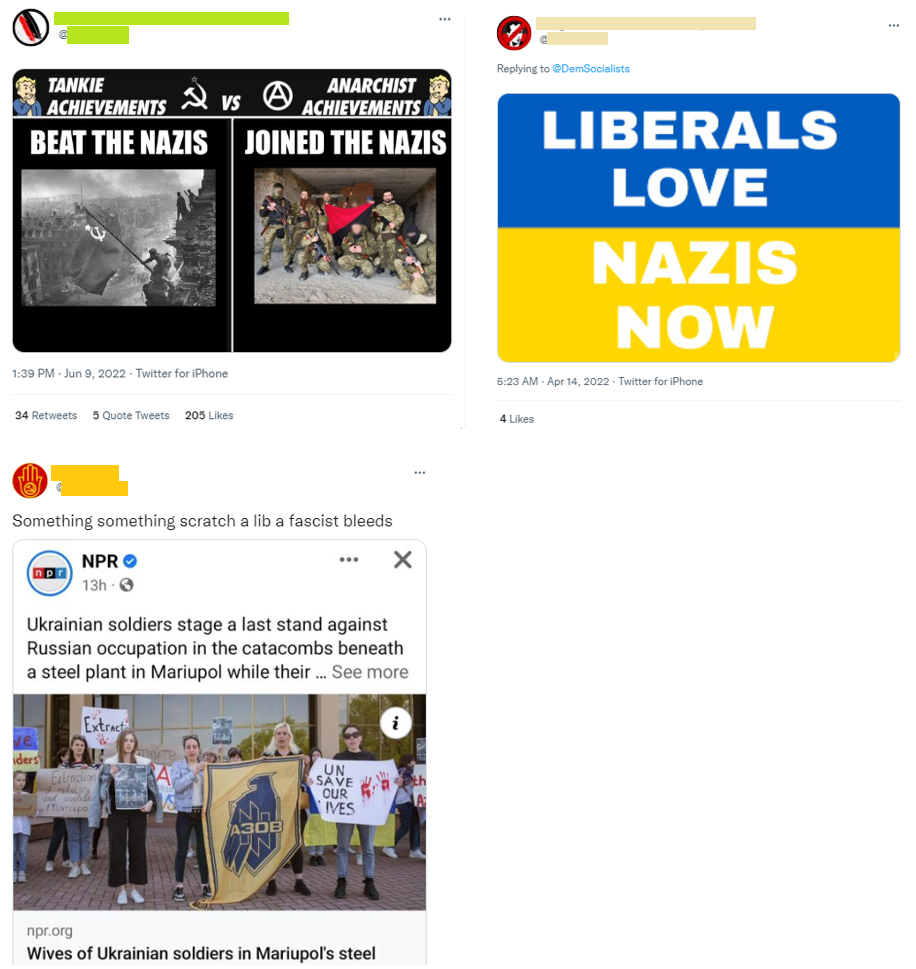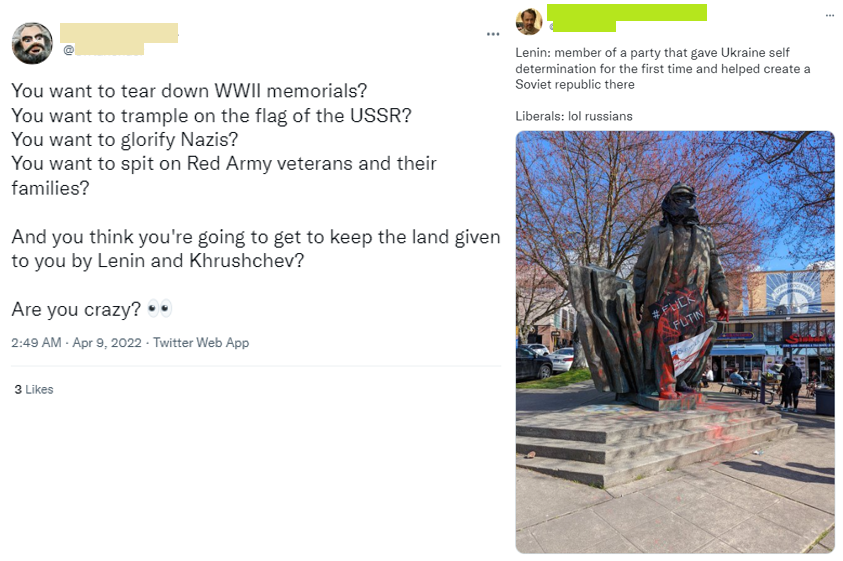Contextualising Rhetoric around ‘Fascism’ Targeting Ukraine and Western Support
2 August 2022
This is the first in a four-part Dispatch series which will explore the pro-Kremlin rhetoric of ‘fascism’ in the context of Russia’s invasion of Ukraine. We explain how supporters of and apologists for the invasion construct narratives and messaging through the distortion of historical events. These actors have variously used selective presentation, de-contextualisation, deception and disingenuous framing relating to Ukraine, NATO allies and the West. Each of these tactics plays a different role in promoting the Kremlin’s agenda.
This Dispatch contextualises the Kremlin’s accusation of ‘fascism’ and ‘Nazism’ against Ukraine. It aims to show the warping of this terminology by pro-Kremlin actors and explores the use of this narrative among Twitter users who support or defend the invasion.
_________________________________________________________________________________
The decontextualisation of ‘denazification’
When Vladimir Putin announced the euphemistically labelled ‘special military operation’ in Ukraine, he claimed that the goal of the invasion was the ‘demilitarisation and denazification’of its neighbouring state. The term ‘denazification’ (German: Entnazifizierung) historically refers to a policy by the Allied Forces to purge ideological elements of National Socialism from German and Austrian society after WWII. It is a term rooted in a specific time and socio-political context. Yet Putin has appropriated ‘denazification’ to justify the invasion of Ukraine — a contemporary, predominantly Slavic nation that underwent pro-democratic changes following the Euromaidan protests in 2014.
Following the Euromaidan protests, Russian media has framed ongoing conflict in Ukraine as a battle against ‘fascism’, claiming that Ukraine has been overtaken by a ‘fascist junta’ and exploiting the strong resonance the term ‘fascism’ carries in Russia.
Despite the historical inaccuracies, Russia’s claims of ‘fascists’ and ‘Banderites’ running loose in Ukraine are gaining traction among Twitter users. We looked at posts containing hashtags related to claims of ‘Ukranian Nazism’, including #NaziUkraine, #Banderites and #Ukronazis, between 12 May – 10 June 2022. Content largely aligned with the Kremlin propaganda narratives outlined below.
Ukraine is a ‘Nazi collaborator’
The conflation of Ukraine with Nazis has been part of Russia’s ongoing propaganda against Kyiv. The following tweets point to the contentious legacy of Stepan Bandera, a leader of the Organization of Ukrainian Nationalists who collaborated with the Nazis during WWII in an attempt to establish Ukrainian sovereignty. However, Hitler had no interest in an independent Ukrainian state, and Bandera was ultimately imprisoned at Sachsenhausen and murdered by the KGB in 1959. Today, some in Ukraine revere Bandera as a freedom fighter, while others view him as a Nazi collaborator. The ongoing references to Bandera and ‘Banderites’ in pro-Kremlin propaganda are an attempt to oversimplify a part of Ukraine’s history that the nation remains divided over.

Image 2: Screenshots of Twitter posts.
These tweets also reflect the pro-Kremlin narrative that the movement for Ukrainian independence started with Bandera or other WWII-era figures. In reality, Ukrainian independence began after the fall of the Russian Empire in 1917 when Ukrainians fought against the Red Army to establish an independent republic before being eventually defeated in 1921. Describing pro-independence actors and elements in Ukraine as ‘fascist’ has been a narrative used since the Cold War, when Ukrainian national identity was dismissed as ‘Banderite thuggery‘ by Soviet propaganda.
Ukraine’s complicated sovereignty
Bandera’s controversial life story is just one part of Ukraine’s complex modern history, which includes partitions, a famine that killed millions, and an invasion by Germany in 1941 that drew varied reactions from the Ukrainian population. Some initially welcomed Nazi Germany’s Wehrmacht as liberators from Soviet tyranny, others joined anti-German partisan movements, and some started to fight against both totalitarian oppressors.
Ukraine’s history is often characterised as moving between extremist ideologies, with a relatively short period of independence. Its cultural memory remains contested, and the categorising of some so-called national heroes might be deeply alienating to foreign onlookers. However, Putin’s rhetoric of ‘denazification’ appears to target a Ukrainian identity distinct from a Russian one, rather than public veneration of WWII-era collaborators.
Ukraine has ‘abolished the left’
In July 2021, Putin published an essay titled ‘On the Historical Unity of Russians and Ukrainians’, which claimed that Ukraine can only achieve real sovereignty by unifying with Russia. The text indicates how Putin regards Ukraine as part of Russia’s historic territory. Other Russian leaders have made similar claims; One Kremlin ideologist said that “Ukraine-ness” was a “disorder of the mind”, and Russian author Timofey Sergeytsev wrote “denazification will inevitably be de-Ukrainianisation”.
Furthermore, Putin has argued that foreign actors are promoting Ukrainian nationalism to weaken Russia. This claim was historically used by the Tsarist and Soviet regimes to dismiss the notion that people under their rule had any agency or will of their own. The notion that Ukraine has no distinct culture or history, but is rather an extension of the Russian nation, contradicts Russia’s argument that Ukrainians are fascists. However, it does support the idea that Ukraine’s rejection of Russian control must mean they have been misled by some sinister ideology — Russian disinformation isn’t about logic but rather distorting reality.
Current President Volodymyr Zelenskyy’s Servant of the People party is a liberal, pro-European party. Content, particularly prominent amongst accounts on the authoritarian far-left, promoted Kremlin propaganda narratives which claim that the government is a Nazi regime and supports Nazism in Ukraine.

Image 4: Screenshot of Twitter posts.
Kremlin rhetoric around ‘fighting Nazis’ harnesses both the trauma and victory of WWII, meaning it is likely targeted at a Russian audience, rather than an international one. The German invasion of the Soviet Union led to heavy casualties and widespread suffering and continues to fuel fears of a ‘foreign invader’. Simultaneously, many scholars have highlighted the importance of the legacy of Soviet victory in WWII for Putin’s vision of Russian and the world. Zhurzhenko argues that after the collapse of the USSR, victory over Nazi Germany was “Russia’s only remaining positive legacy of the Soviet era”, and Putin claims to be fighting a continuation of this struggle in Ukraine.
In reality, re-evaluations of the USSR’s role in WWII began under Boris Yeltsin, as the secret clauses to the Molotov-Ribbentrop Pact and documents regarding the massacre of Polish officers at the hands of the Red Army at Katyn Forest were published. Under Putin’s rule, however, attempts to rationalise the true Soviet legacy in WWII have been obstructed in favour of a re-telling of history that absolves the USSR from any crimes. Again, such actions are in line with a Soviet trend of falsifying history and suppressing academic research.
Following Russia’s invasion, Ukraine suspended 11 political parties with ties to Russia. Far-left users on Twitter started to claim that this was an attempt to suppress Communist parties, and an indication that Ukraine was guided by fascist ideology.

Image 6: Screenshot of Twitter posts.
This narrative vilifies the refusal within Ukraine (as well as other former Soviet Union states) to honour Soviet symbols. It also creates expectations that these countries are obliged to show gratitude to their former dictators. This refusal has been interpreted by pro-Putin and Marxist-Leninist accounts as an indication that Ukraine is ‘fascist’, or otherwise has no right to exist as a sovereign state.
Conclusion
This short analysis shows how pro-Kremlin state-sponsored narratives about Ukraine being a fascist state are being picked up by non-state actors, especially by defenders of the contemporary Russian regime or the Soviet Union. While there are some concerning social trends in Ukraine, such as the veneration of Stepan Bandera in certain areas of the country, it is deceptive to claim Ukraine is a ‘fascist state’. Instead, the accusation of ‘fascism’ is weaponised against the very idea of Ukrainian nationality and independence. It simplifies complex aspects of Ukraine’s present and past.
The piece highlights the need for nuanced information amidst the vulnerabilities arising from an unsophisticated understanding of history. While public education about a nation’s history and remembrance of its darker chapters are central to democratic debate, pro-Kremlin actors have reframed history to de-legitimise Ukraine’s right to self-defence, deflecting from Russia’s invasion of a sovereign neighbouring country.
The year Bandera was murdered by the KGB was corrected from 1956 to 1959 on 10 August 2022.




